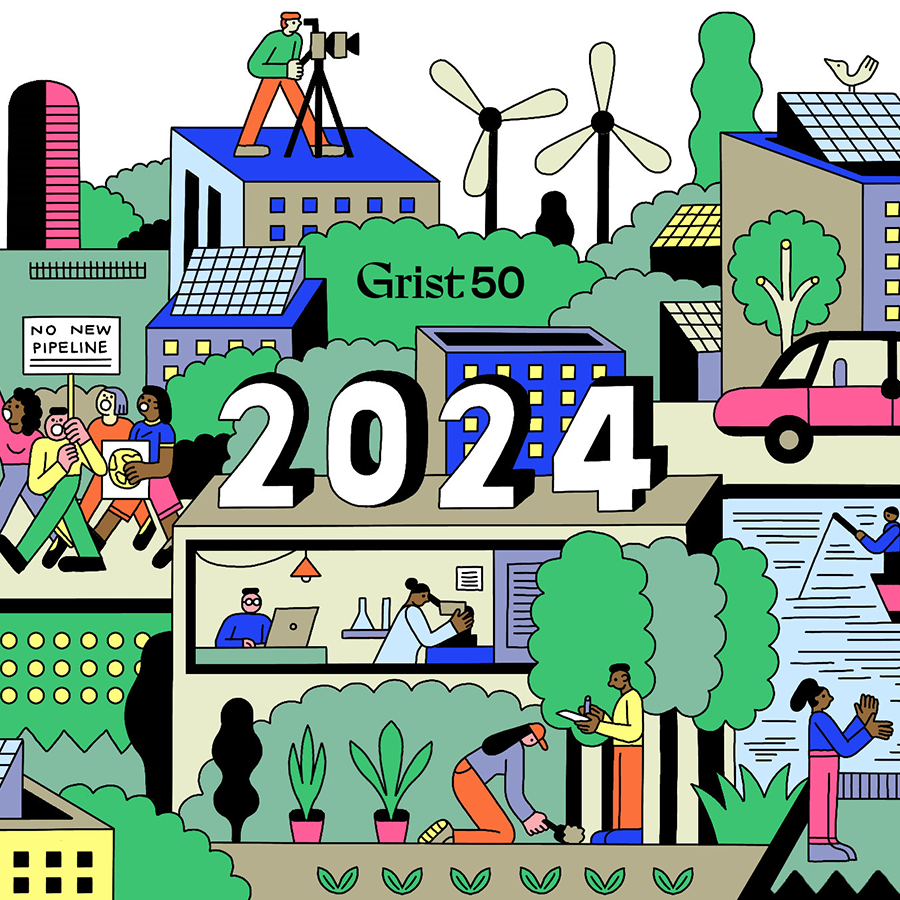
The spotlight
Hey there, Looking Forward fam. Today, the Grist team launched one of our biggest and most solutions-y projects of the year — a project that I have been working on for many, many months and am beyond excited to share with y’all today: the 2024 Grist 50 list.
This is the ninth edition of a project that Grist has been publishing since 2016, spotlighting 50 leaders at the forefront of solutions to some of the most pressing problems our planet faces. But in truth, this list isn’t about singular leaders who are “saving the world.” It’s about the stories of people working in community, with community, and for community.
That includes policymakers, farmers, teachers, entrepreneurs, and activists. Artists weaving climate narratives into stories about family and identity, engineers bringing renewable energy to remote tribal nations, advocates fighting for better protections for workers. And more.
And the Grist 50 list itself, celebrating the stories of these dynamic people, would not be possible without the communities around them — including the people who nominated them for the list. Often those nominators include colleagues, collaborators, friends, even family members. I can’t stress enough how much we love reading these insights, learning about the awesome climate work going on all over the country and the way these leaders have touched the lives of those around them. (We typically get somewhere in the neighborhood of 1,000 nominations for each year’s Grist 50, and we research every single name that comes through our nomination form).
We hope you’ll enjoy checking out the full 2024 Grist 50 list.
For this newsletter, we’ve compiled a few of the standout nominations from 2024, for a behind-the-scenes look at some of this year’s featured leaders.
— Claire Elise Thompson
![]()
Amos White was nominated by a collaborator, Danner Doud-Martin
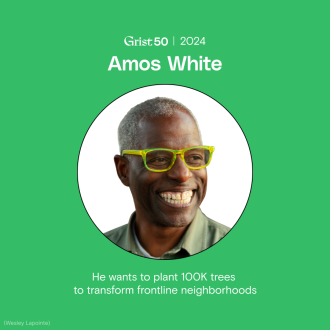
When Amos White, the founder and chief planting officer of 100K Trees for Humanity, demonstrates the art of tree planting, you can’t help but be captivated by his profound message and mission. As he imparts the intricacies of releasing bound roots from the pot and the proper technique for holding a tree, a revelation unfolds about the transformative role each tree plays in soil rejuvenation and carbon sequestration. Amidst a sprinkle of tree-related humor, Amos delves into the critical issues of environmental injustice, emphasizing the pressing need to plant trees in underserved communities.
Amos’ infectious passion for tree planting may be unfamiliar terrain for those unaccustomed to getting their hands dirty or planting trees. Yet after a session with him, the desire to repeat the experience becomes undeniable. The act of planting, even for the first time, carries with it the potential to alleviate the weight of climate anxiety, offering a tangible way for individuals to contribute to climate change mitigation within their communities.
This is how I feel every time I am around Amos and I am honored to have partnered with him and 100K Trees for Humanity for the past three years.
— Danner Doud-Martin
Deenaaalee Chase-Hodgdon was nominated by fellow fisher (and Fixer) Noah Oppenheim
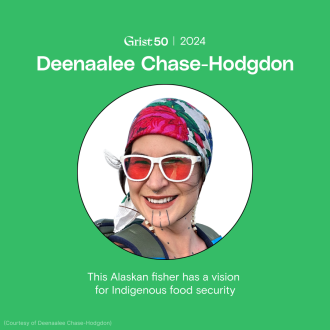
Deenaalee is an extraordinary young Alaska Native leader. They are developing an equitable approach to decolonizing the seafood industry in Alaska through traditional practice, storytelling, just transition, and Native ownership of access rights. They are also heavily involved in conservation policy advocacy in Alaska and as a youth representative to the Arctic Council.
— Noah Oppenheim
Alicia Brown was nominated by a collaborator, Andy Posner
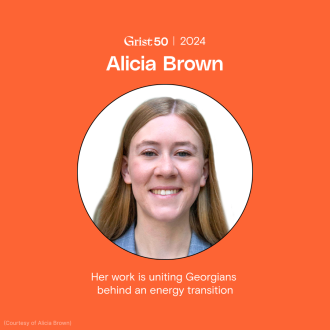
Alicia is an absolute dynamo, an assertion I can back up with firsthand experience. I run a nonprofit lender called Capital Good Fund, and in late 2021, she reached out to me to ask if I would consider bringing our solar loan to Georgia — an idea that seemed crazy at the time. However, the Inflation Reduction Act made the solar tax credit refundable to nonprofits, and so I reached back out to Alicia to say, “Hey, if I were to design a solar leasing program for low-income Georgians, would you help make it happen?” She said yes, and boy has she stepped up. It is thanks to her work — making introductions to funders, governments, community groups, regulators, and others — that we have launched the first-ever solar lease where a nonprofit is the lessor. And we have done so in a state with relatively low-cost energy, no net-metering, and an underdeveloped residential solar market.
Alicia has done everything from talk to individual homeowners in their kitchens about the program to, just last week, intervening in a rate case with the Public Service Commission, calling on the PSC to enact a virtual power plant program, or VPP. In that rate case, Alicia spearheaded a coalition of local governments and organized several witnesses, including myself, to testify in favor of a VPP — and the commission seemed favorably inclined to authorize it. What’s more, thanks to Alicia, Capital Good Fund was the lead applicant on a $250 million Solar for All grant, with Savannah, Decatur, and Atlanta as members of the coalition; Alicia wrote 80 percent of the grant herself, and secured over 90 letters of support. And that is but a small set of examples of how hard she works to ensure equity and justice are embedded in the design of programs that reduce emissions, improve air quality, and create jobs.
— Andy Posner
Jessica Dandridge-Smith was nominated by one of her board members at the Water Collaborative of Greater New Orleans, Kristin Tracz

Jessica is a daughter of New Orleans, who leads with her whole heart. She has transformed the Water Collaborative from a loose collection of planners and engineers to a force for advocacy on issues of water justice, equity, and access. Water issues are of burning importance in the Gulf South; Jessica helps to break down complicated regulatory rules, challenging legal concepts, and the basics of stormwater and drinking water to make water advocacy accessible to all New Orleanians.
She has spearheaded the Water Justice Fund, and is pushing for major change at the city [level] and the water utility. She has anchored an artist collaborative to help communicate through nontraditional advocacy channels; she has launched a drag show pool party fundraiser to make water fun for all. She designed and implemented a planter box competition to engage and beautify neighborhoods. She brings water home for all, while ensuring all voices are heard. She is a force of nature.
— Kristin Tracz
Cate Mingoya-LaFortune was nominated by her colleague at Groundwork USA, Abbie Dusseldorp
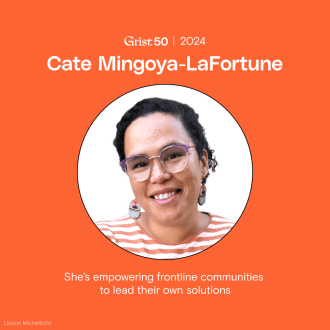
If you’ve ever heard Cate speak before, you’ve likely heard that she lived in New York City during the early days of the mayor’s MillionTreesNYC campaign. One day, the city came in to line her block with saplings, and the next day, the tops of all the baby trees were gone. When Cate tells this story, the punchline is that community involvement in greening initiatives is essential. But the part that I find most inspiring is that every time this story is told, Cate never fails to mention that it was her neighbor, an older woman who spent her days keeping a close eye on the comings and goings of the neighborhood, who named to her that the city should have just asked what the community really wanted. This deep, unwavering commitment to recognizing and uplifting people is the constant throughline at the heart of all of Cate’s climate justice work.
While her career spans multiple roles — teacher, planner, organizer — at Groundwork USA, she’s combined these skills with her passion for people-centered action to lead the Climate Safe Neighborhoods partnership. This 16-city collaboration combines the power of history, data, storytelling, and community organizing to put community members in the driver’s seat for shaping their future. The program has led not only to millions of dollars invested in community climate priorities, but the reimagining of decision-making systems in ways that put people first. Behind the work, Cate is an engine of hope in a field where it’s so easy to become disheartened. She is the first to remind us all that there is no one solution to the climate crisis, but that small, incremental change — one more basement that doesn’t flood, small reductions in heat, or one more safe green space to be outdoors — matters.
— Abbie Dusseldorp
See for yourself
Check out these five people’s final profiles, and the full 2024 Grist 50 list here!
And we would be remiss not to mention that the Grist 50, like all of Grist’s work, is made possible (and freely available) thanks to the support of our readers. The many months’ worth of effort that goes into researching and reviewing nominations, reporting and writing profiles, and designing and building the list itself would not happen without people like you, who care about bringing meaningful climate stories to the fore. If you’d like to become a contributing Grist member, you can learn more here.
A parting shot
And on a totally non-Grist 50 note — something incredible has happened, y’all. Remember when I wrote about the trend of TikTok recipes leading to real-world shortages of viral ingredients (notably cottage cheese and feta)? I was curious if a humble vegetable could ever experience the TikTok feta effect. Well, a humble vegetable has. Last month, the BBC reported that supermarkets in Iceland were struggling to keep cucumbers on their shelves, thanks in part to a viral recipe from influencer Logan Moffitt, aka ”the cucumber guy.” The recipe in question is a simple but alluring salad combining cucumber slices with sesame oil, garlic, rice vinegar, and chili oil — but Moffitt has become famous for posting cucumber recipes almost daily, coaching viewers through various ways to eat an entire cuke in one sitting. (NPR has even declared this “the summer of cucumber salad.”)
If you try one of Moffitt’s recipes, please reply to this email to tell me how you like it!



